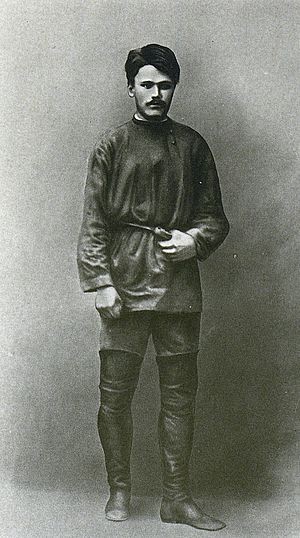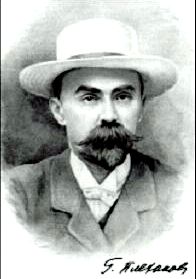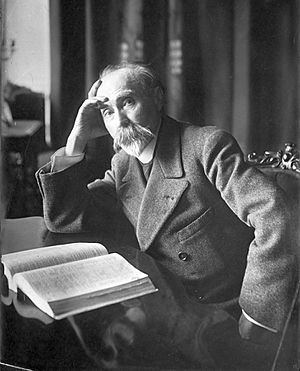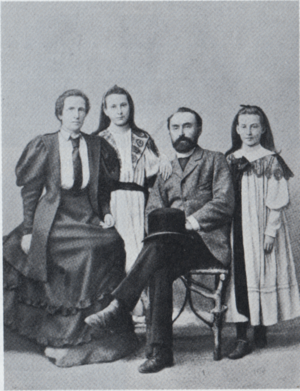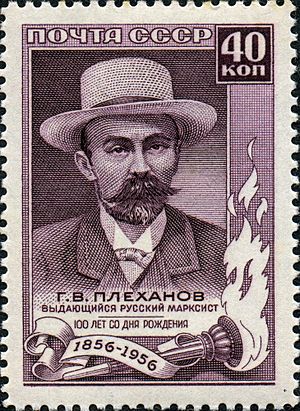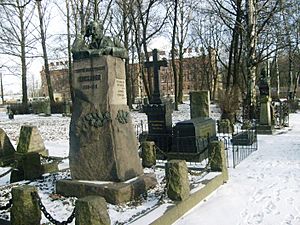Georgi Plekhanov facts for kids
Quick facts for kids
Georgi Plekhanov
|
|
|---|---|
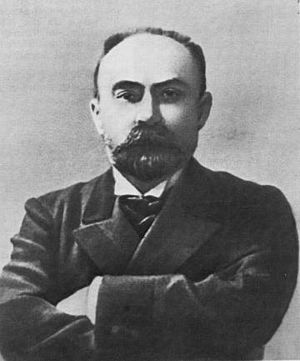 |
|
| Born |
Georgi Valentinovich Plekhanov
11 December 1856 Gudalovka, Tambov Governorate, Russian Empire
|
| Died | 30 May 1918 (aged 61) Terijoki, Finland
|
| Education | Voronezh Military Academy St. Petersburg Metallurgical Institute (withdrew) |
| Spouse(s) | Rozaliia Bograd-Plekhanova |
| Era | 19th-century philosophy |
| Region | Russian philosophy |
| School | Marxism Dialectical materialism Historical materialism |
|
Influences
|
|
|
Influenced
|
|
Georgi Valentinovich Plekhanov (born December 11, 1856 – died May 30, 1918) was a very important Russian thinker and revolutionary. He is known as the "father of Russian Marxism." Marxism is a way of thinking about society, economics, and politics based on the ideas of Karl Marx.
Plekhanov helped start the social-democratic movement in Russia. He was one of the first Russians to call himself a "Marxist." Because of political problems, he moved to Switzerland in 1880. There, he continued to work to change the government in Russia, which was then ruled by a Tsar (an emperor).
Even though he came from a noble family that owned land and serfs (people who were like slaves), Plekhanov disagreed with his family's social class. As a student, he became a Marxist. Later, he supported the Bolshevik group for a short time in 1903. However, he soon disagreed with their ideas and became a main opponent of Vladimir Lenin and Leon Trotsky during the 1905 Russian Revolution.
During World War I, Plekhanov supported the countries fighting against Germany. He returned to Russia after the 1917 February Revolution. He was against the Bolshevik government that took power later that year. He died the next year from tuberculosis in Finland. Even with his strong disagreements with Lenin's party, Plekhanov was still highly respected after his death. He was seen as a founder of Russian Marxism and a great thinker.
Contents
Early Life and Education
Georgi Valentinovich Plekhanov was born on November 29, 1856, in the village of Gudalovka, Russia. He was one of twelve children. His father, Valentin Plekhanov, was from a Tatar noble family and owned land and about 50 serfs. Georgi's mother, Maria Feodorovna, was related to the famous writer Vissarion Belinsky.
Georgi started his formal education in 1866 at the Voronezh Military Academy when he was 10. He was a good student and well-liked. His mother later said that the liberal ideas he learned there helped him become a revolutionary.
After his father died in 1873, Plekhanov left the Military Academy. He then enrolled at the St. Petersburg Metallurgical Institute. In 1875, he met a young revolutionary named Pavel Axelrod. Axelrod was impressed by Plekhanov's love for learning and his thoughtful way of speaking.
Under Axelrod's influence, Plekhanov joined the populist movement. This was a group of activists who wanted to help the common people. He became active in a main revolutionary group called "Zemlia i Volia" (Land and Liberty). Plekhanov never finished his studies at the Institute.
Becoming a Political Activist
Plekhanov helped organize some of the first political protests in Russia. On December 6, 1876, he gave a powerful speech in front of the Kazan Cathedral in Saint Petersburg. In his speech, he spoke out against the Tsarist autocracy (the absolute rule of the Tsar). After this, he had to live in hiding to avoid being caught. He was arrested twice, in 1877 and 1878, but was released quickly both times.
Plekhanov was first a populist, but after moving to Western Europe, he started connecting with other social-democratic groups. He began to study the writings of Karl Marx and Friedrich Engels. In 1879, when some populists debated using terrorism, Plekhanov strongly opposed it. He believed that terrorism would waste the energy of revolutionaries and lead to harsh government crackdowns. He was so sure of his views that he was ready to leave the revolutionary movement rather than agree to terrorism.
Plekhanov started a small populist group called Chërnyi Peredel (Black Repartition). This group tried to argue against the growing terrorist movement, Narodnaya Volya (the People's Will). However, Plekhanov's group was not very successful.
In 1879, he married Rozaliia Bograd-Plekhanova, a medical student and activist. She joined him in 1880 when he left Russia for Switzerland. He would not return to Russia for 37 years.
Over the next three years, Plekhanov read many books on political economy. He slowly began to doubt his belief in the revolutionary power of the traditional village commune. Between 1882 and 1883, Plekhanov became a strong believer in Marxism. In the late 1880s, he even met Friedrich Engels in person.
Plekhanov also became a strong supporter of central control within the movement. He believed that to achieve a socialist future, Russia first needed to develop its capitalist system.
In September 1883, Plekhanov, along with his friend Pavel Axelrod and others, formed the first Russian Marxist political group. It was called the Gruppa Osvobozhdenie Truda or the "Emancipation of Labor Group." This group, based in Geneva, tried to share the economic and historical ideas of Karl Marx. They were quite successful and attracted important thinkers like Peter Struve and Vladimir Ulianov (Lenin).
In 1900, Plekhanov, Axelrod, and others, including Lenin, started a Marxist newspaper called Iskra (The Spark). The goal was to unite different Marxist groups into one organization. This effort led to the creation of the Russian Social-Democratic Labor Party (RSDLP). This large group soon split into two main parts: the Bolsheviks and the Mensheviks.
At first, in 1903, Plekhanov sided with Lenin at the Second Congress of the RSDLP. However, he soon disagreed with Lenin's ideas. During the Russian Revolution of 1905, Plekhanov often criticized Lenin and the Bolsheviks. He believed they did not understand that Russia needed to develop capitalism first before it could become a socialist society. He thought the Bolsheviks' goals were unrealistic for Russia at that time.
Plekhanov believed that Marxists should focus on everyday struggles rather than only on big revolutionary goals. He also thought that the Russian Social-Democratic Labor Party should be run democratically.
Important Writings
During this time, Plekhanov started writing and publishing his important political works. These included the short book Socialism and Political Struggle (1883) and the longer book Our Differences (1885). These books were the first to explain Marxist ideas to a Russian audience. They also showed how Marxists differed from the Populist movement. Lenin called Socialism and Political Struggle the "first declaration of faith of Russian socialism." Plekhanov famously said, "without revolutionary theory there is no revolutionary movement." In Our Differences, Plekhanov explained that capitalism was starting to grow in Russia, especially in factories and farming. He argued that a working class was forming in Russia, and this class would eventually bring about socialist change.
In January 1895, Plekhanov published his most famous work, The Development of the Monist View of History. This book was allowed to be published legally in Russia. Plekhanov used a fake name, Beltov, and a confusing title to trick the Russian government's censors. His book became very popular in defending the idea that history is shaped by material conditions. Lenin later said that Plekhanov's book "helped educate a whole generation of Russian Marxists."
Friedrich Engels, a close friend of Karl Marx, wrote to Plekhanov, congratulating him on the "great success" of getting the book published in Russia. Engels thought the book came out at a perfect time because Tsar Nicholas II had just announced that he would return Russia to the absolute rule of his father. Engels believed Plekhanov's book would help increase public protest.
Throughout the 1890s, Plekhanov worked on three main types of revolutionary writings. First, he showed the connection between earlier French materialist thinkers and Marx's ideas. Second, he wrote about the history of materialism and how it fought against ideas from the wealthy class. In his 1898 book, "On the Individual's Role in History," he argued against the "great man theory" of history, which says that history is made by a few important individuals. Third, Plekhanov defended revolutionary Marxism against critics who wanted to change its core ideas.
Even though they had strong disagreements, Lenin recognized Plekhanov's huge contributions to Marxist philosophy and literature. Lenin wrote that Plekhanov's past work was "immense." After the October Revolution, Lenin even insisted that Plekhanov's philosophical works be republished and made required reading for future communists.
Plekhanov believed that art did not have to serve political goals. He thought that only art that serves history, not just temporary pleasure, was truly valuable.
During the War Years
When World War I began, Plekhanov strongly supported the Entente powers (like France, Britain, and Russia). Because of this, Lenin and his friends called him a "Social Patriot." Plekhanov was sure that German imperialism (when a country tries to expand its power) caused the war. He believed that a German victory would be very bad for working people in Europe.
Plekhanov was initially upset by the February Revolution of 1917 because he thought it would hurt Russia's war effort. However, he soon accepted it as a long-awaited democratic revolution that would help support the war. He then returned home to Russia.
Plekhanov was very much against the Bolshevik Party led by Lenin. He was a leader of a small group called Yedinstvo. He criticized Lenin's revolutionary ideas, calling them "ravings." He even called Lenin an "alchemist of revolution" because Lenin seemed willing to skip the capitalist stage of development in Russia and go straight to a socialist revolution. Plekhanov supported the idea that Lenin was a "German agent" and urged the Russian government to take strong action against the Bolsheviks.
Family Life
In 1879, Plekhanov married Rozalia Bograd. She joined him when he went into exile in Switzerland in 1880. They had four daughters, but two died when they were young. Rozalia was born in 1856 in a Jewish community in Ukraine. She studied to be a doctor in Saint Petersburg. She also joined the Populist movement, trying to raise political awareness among farmers. She worked as a doctor during the Russo-Turkish War (1877–1878), where she saw bad medical care and corruption. These experiences made her even more radical.
Rozalia was not allowed to graduate in Russia, so she studied again in Switzerland. She supported her family in Geneva by working as a doctor. They lived in Geneva, Paris, and for a time in Italy for Plekhanov's health. She went back to Petrograd with her husband after the February Revolution and was with him when he died in Finland in 1918. She returned to Paris and died in 1949.
Death and Lasting Impact
Plekhanov left Russia again after the October Revolution because he was against the Bolsheviks. He died from tuberculosis in Terijoki, Finland (now called Zelenogorsk), on May 30, 1918. He was 61 years old. At his funeral, a musician played a funeral march by Beethoven. Plekhanov was buried in the Volkovo Cemetery in St. Petersburg, near the graves of other famous Russian thinkers.
Even though Plekhanov and Lenin had different ideas about political action, Soviet Communists honored Plekhanov's memory. They named the Soviet Academy of Economics and the G. V. Plekhanov St. Petersburg State Mining Institute after him.
Throughout his life, Plekhanov wrote many important works on historical materialism (the idea that history is shaped by economic and social conditions). He also wrote about the history of materialist philosophy and the role of individuals and groups in history. Plekhanov always insisted that Marxism was a materialist idea, not an idealist one. He believed that Russia needed to go through a capitalist stage of development before it could become socialist. He also wrote about the connection between society's economic base and its culture and ideas, and the role of art. He is remembered as a very important and early Marxist thinker on these topics.
See also
 In Spanish: Gueorgui Plejánov para niños
In Spanish: Gueorgui Plejánov para niños
 | James B. Knighten |
 | Azellia White |
 | Willa Brown |


